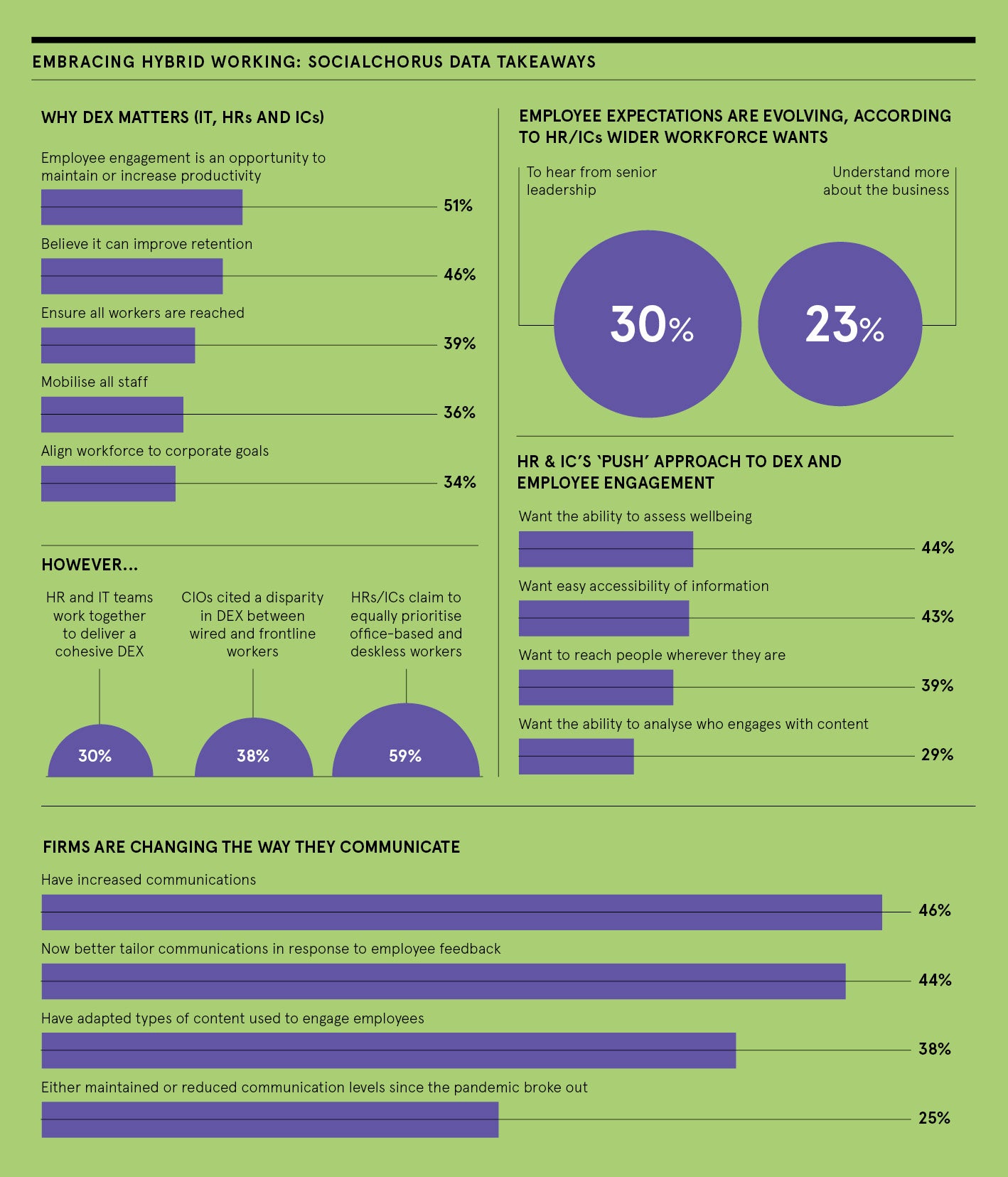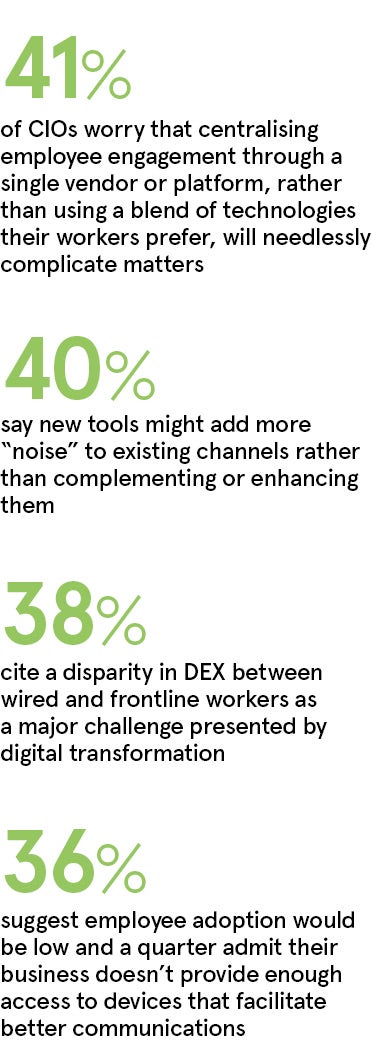The workforce and workplace have undergone a seismic evolution in the last 12 months and such rapid progress should be cause for celebration. However, fresh evidence reveals there are gaping and, because of the incredible pace of change, growing fissures that leaders must address urgently.
Organisations worldwide scrambled into crisis mode when the coronavirus pandemic hit to achieve business continuity. Remote working was necessitated by lockdown and enabled by technology while digital transformation plans were yanked forward by years.
The direction of travel is clear. Given that numerous surveys highlight people would prefer to work at least partly from home, businesses must embrace hybrid working and the digital era. But effective coordination and communication are hugely challenging if relying upon a hodgepodge of old ways of working and bolted-on technology solutions.

Leaders must grasp the opportunity to rethink and shape the future of work, as vaccines are rolled out and restrictions begin to ease. We need to talk about the digital employee experience (DEX).
Even before COVID-19 struck, too much digital noise was a pain point for wired workers. The speed of digital transformation, coupled with the enforced shift to remote working, has amplified problems; desk workers don’t know which of the numerous applications or tools they require for specific tasks.
Conversely, deskless workers struggle to access basic information and systems. Further, a lack of reach across the entire business, especially frontline workers, busy desk staff and employees in the field, has been exacerbated by the rise of remote working, leading to a disengaged, overwhelmed and unmotivated workforce.
New SocialChorus research exposes these broken business systems. Moreover, it indicates that it is critical to fix disconnected leadership, dismantle silos that impede development, and improve company-wide communication and collaboration to survive and thrive in the new normal.
Delivering the correct signal through the noise
As we discovered in lockdown, the right technology can solve these challenges. To maximise the potential of tech, though, there needs to be a more orchestrated strategy. For their organisation’s future, where agility and collaboration will be essential, individuals – whether desk or deskless workers – have to be empowered, engaged, aligned and motivated. Leaders need to take charge and work together to drive better DEX.
Indeed, according to our data, just 30 per cent of human resource (HR) and internal communications (IC) staff say they collaborate with their information technology departments. To deliver successful employee engagement, senior leadership needs to unify these conflicting views or face the long-term effects of low morale, a disengaged workforce and insufficient productivity levels.
And, rather worryingly, 88 per cent of chief information officers (CIOs) believe the purchasing decision for collaboration and communications tools rests with them, with only 11 per cent stating it was a decision for their HR and IC colleagues. The findings uncover a clash between CIOs’ “pull” and HR/ICs’ “push” approaches designed to meet their organisation’s DEX requirements.

Ultimately, our global research, conducted by Opinion Matters and which surveyed 750 CIOs and 753 HR and IC professionals, underlined that without a strong DEX, businesses risk creating a workforce that’s feeling burnout and disconnected from the business, hindering success. SocialChorus’ driving goal is to make the DEX work for every worker so businesses can deliver the correct signal through the digital noise.
As the war for talent intensifies, progressive business leaders realise that better DEX, which is personalised, targeted and meets people on whichever device or digital channel works best for them, is crucial to attracting and retaining staff. DEX is increasingly vital to smooth the onboarding process. Additionally, supporting wellbeing and mental health is more important than ever during this uncertain time when change is the only constant.
For example, the SocialChorus FirstUp platform uses automation to target the right content, resources and systems access to each employee on a personalised basis. It also unifies analytics that gather behavioural and engagement data across all enterprise systems, providing real-time visibility into how the business performs, thereby optimising strategic initiatives.
Finally, senior leaders must remember that all employees have a voice too and, again, this is enabled by DEX. If they can build their communications around what their workforce wants and needs to do their jobs better, they’ll see their businesses triumph during these testing times and beyond.
Benefits of collaboration and dual DEX decisions
SocialChorus research shows the void between the departments entrusted with improving employee engagement. Specifically, there is a detrimental “push” and “pull” approach to digital employee experience, or DEX, by human resources and internal communications professionals, and chief information officers respectively.
When asked to name their organisation’s biggest opportunities around employee experience, both groups agree increased productivity could be the greatest outcome: 56 per cent of CIOs cite this output along with 47 per cent of those in HR and IC.
True, technology can underpin collaboration and narrow the gap between the pull engagement favoured by CIOs and the push strategies lauded by HR and IC. But for organisations to reap the rewards of dual DEX decisions, leaders must break down silos and open talks for a more collaborative, holistic approach that will benefit the business in both the short and long term.
For more information please visit socialchorus.com
Sponsored by
The workforce and workplace have undergone a seismic evolution in the last 12 months and such rapid progress should be cause for celebration. However, fresh evidence reveals there are gaping and, because of the incredible pace of change, growing fissures that leaders must address urgently.
Organisations worldwide scrambled into crisis mode when the coronavirus pandemic hit to achieve business continuity. Remote working was necessitated by lockdown and enabled by technology while digital transformation plans were yanked forward by years.
The direction of travel is clear. Given that numerous surveys highlight people would prefer to work at least partly from home, businesses must embrace hybrid working and the digital era. But effective coordination and communication are hugely challenging if relying upon a hodgepodge of old ways of working and bolted-on technology solutions.


